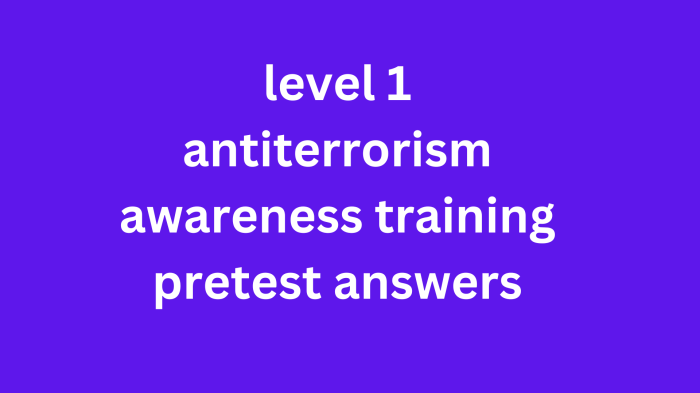Level 1 antiterrorism awareness training pre test answers – Level 1 Antiterrorism Awareness Training Pre-Test Answers: Equipping individuals with the knowledge and understanding necessary to recognize and respond to potential terrorist threats effectively. This comprehensive guide provides a clear overview of key concepts, definitions, and practical measures for enhancing personal preparedness and contributing to community safety.
Delving into the intricacies of terrorism, this training pre-test empowers individuals to identify suspicious behaviors, report concerns promptly, and adopt protective measures to mitigate risks. By fostering a heightened sense of antiterrorism awareness, this guide empowers individuals to play a vital role in safeguarding themselves and their communities against potential threats.
Level 1 Antiterrorism Awareness Training Pre-Test Overview
The Level 1 Antiterrorism Awareness Training Pre-Test is designed to assess individuals’ understanding of basic antiterrorism concepts and preparedness measures. It serves as a baseline assessment for individuals who are required to undergo comprehensive antiterrorism awareness training.
The target audience for this training includes individuals from various sectors, including government agencies, private organizations, educational institutions, and the general public. The test is designed to provide a foundation of knowledge for individuals who need to enhance their awareness of potential terrorist threats and their responsibilities in preventing and responding to them.
The test format consists of multiple-choice questions covering the following content areas: definitions of terrorism and antiterrorism awareness, threat levels and indicators, recognizing and reporting suspicious activity, personal preparedness and protective measures, and the role of law enforcement and emergency responders.
Key Concepts and Definitions: Level 1 Antiterrorism Awareness Training Pre Test Answers

Terrorismis the unlawful use of violence or the threat of violence to achieve political, religious, or ideological goals. Terrorism can take various forms, including bombings, shootings, kidnappings, and cyberattacks.
Antiterrorism awarenessrefers to the understanding of potential terrorist threats and the measures that individuals and organizations can take to prevent and mitigate them. It involves recognizing suspicious activities and behaviors, reporting them to the appropriate authorities, and taking personal protective measures.
Threat levelsare used to indicate the likelihood of a terrorist attack occurring. They are typically categorized as low, medium, high, or severe. Threat indicators are observable signs or behaviors that may suggest the presence of a potential terrorist threat.
Recognizing and Reporting Suspicious Activity
Suspicious activities or behaviors that may indicate potential terrorist threats include:
- Unattended bags or packages in public places
- Individuals taking photographs or videos of sensitive locations
- People behaving unusually or exhibiting signs of nervousness
- Vehicles parked in suspicious locations or with suspicious occupants
- Individuals attempting to purchase large quantities of chemicals or explosives
If you observe any suspicious activity, it is crucial to report it to the appropriate authorities immediately. This can be done by calling the police or using anonymous reporting systems.
Personal Preparedness and Protective Measures

Personal preparedness involves taking steps to protect yourself and your loved ones in the event of a terrorist incident. This includes:
- Developing a personal emergency plan
- Identifying safe evacuation routes
- Storing essential supplies, such as food, water, and first-aid kits
- Knowing how to perform basic first aid
- Remaining informed about potential threats and safety measures
Role of Law Enforcement and Emergency Responders
Law enforcement and emergency responders play a critical role in preventing and responding to terrorist threats. Law enforcement agencies are responsible for investigating potential threats, apprehending suspects, and enforcing antiterrorism laws. Emergency responders, such as firefighters and paramedics, are responsible for providing medical assistance, evacuating victims, and securing affected areas.
Cooperation and coordination between law enforcement and emergency responders is essential for an effective response to terrorist incidents. This includes sharing information, conducting joint training exercises, and developing coordinated response plans.
Q&A
What is the purpose of the Level 1 Antiterrorism Awareness Training Pre-Test?
The Level 1 Antiterrorism Awareness Training Pre-Test assesses an individual’s baseline knowledge of terrorism and antiterrorism measures, ensuring they possess the necessary foundation for effective training.
What are the key concepts covered in the pre-test?
The pre-test covers essential concepts such as the definition of terrorism, different types of terrorism, antiterrorism awareness, threat levels and indicators, and the importance of recognizing and reporting suspicious activity.
How can individuals prepare for potential terrorist incidents?
Individuals can enhance their preparedness by developing a personal emergency plan, familiarizing themselves with protective measures, and staying informed about potential threats and vulnerabilities.